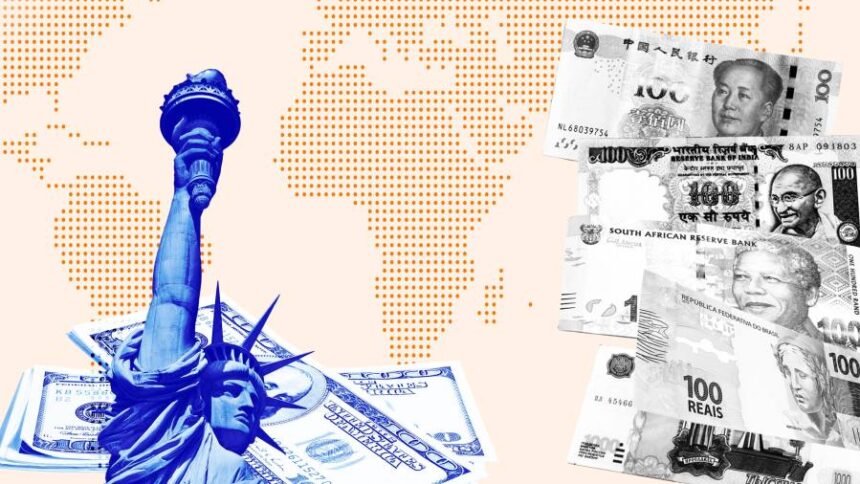Receive free Geopolitics updates
We’ll send you a myFT Daily Digest email rounding up the latest Geopolitics news every morning.
Everyone loves a moonshot metaphor. As a symbol of the shifting geopolitical order, India’s coup in landing the first spacecraft on the south pole of the moon, was irresistible. But it’s the dark side of this week’s Brics summit in Johannesburg rather than the dark side of the moon, which offers a more insightful guide to this fast-changing world — and how the west should navigate it.
The last time South Africa hosted a gathering that marked a global tipping point was Nelson Mandela’s inauguration in 1994. That jamboree of dozens of world leaders signalled a formal end to the region’s years as a cold war chess piece. This week’s in contrast highlighted the risk of the world tilting back into two camps.
Yes, the Brics — Brazil, Russia, India, China and South Africa — are riven by rivalries, fired up with distant dreams, and likely to fall short of many of their ambitions. Yes, the US remains the pre-eminent economy and military power.
But the Brics are on the move. The summit’s closing invitation to two traditional western allies, Saudi Arabia and the UAE, to join the bloc along with Argentina, Egypt, Ethiopia and Iran in a planned first phase of expansion, underlines how a swath of “middle powers” sense a new freedom to chart their own path. And the Brics of course represent a growing share of global trade, population and wealth.
So how should western officials play their hand at a time when the world is clearly becoming more competitive and fluid — and their place in the pecking order is at risk?
The shift has been on the minds of a thoughtful few in Washington for a while. Exhibit A — or rather C or D — reflecting the thinking of the Biden administration was on display last week at Camp David with the signing of a trilateral pact with South Korea and Japan. A diplomatic breakthrough in its own right in relations between Seoul and Tokyo, it was also the latest in a string of bespoke alliances in the Asia-Pacific region.
Administration officials see them as a network which will help ensure America sets the rules for the global order in the next few decades, as it has for the last few. Not noted for its subtlety in world affairs, America is playing its hand quite well, speaking very softly, and yet, via its alliances, carrying a big stick.
The EU is having to play catch-up, aware that it risks becoming a playground, rather than player in its own right. Distracted by Brexit and the ceaseless hunt for trade deals, Britain has also been slow on the uptake.
Senior diplomats have for several years been arguing in favour of a rethink, as well as a reinvestment in postings, language-training and international expertise. As China expanded its presence in Africa 20 years ago, Britain cut back. How deep is Britain’s expertise on, say, Indonesia, the coming giant and the source of so much of the world’s nickel?
Only recently has the message hit home. The Foreign Secretary James Cleverly has made a focus on the “middle powers” a priority. This is where the dual nature of the Brics is relevant with its would-be membership mishmash of democracies, managed democracies, autocracies and worse.
On Wednesday, one of its wannabe members, Zimbabwe, was holding a travesty of an election to ensure its kleptocratic elite stays in power — an elite that is backed by Moscow and Beijing. Also on Wednesday, one of the Brics’ founder members, Russia, blithely explained how one of its president’s erstwhile top allies, the head of the Wagner Group, Yevgeny Prighozin, had died in a plane crash.
Is this the gangsterish type of world that Cyril Ramaphosa, South Africa’s president, India’s prime minister Narendra Modi or President Luiz Inácio Lula da Silva of Brazil would like to see hold sway? Surely not. Their responses to Vladimir Putin’s address, with its familiar claim that the war in Ukraine was all the west’s fault, nimbly avoided endorsing his line.
The new imperialists, China and Russia, breezily suggest that, unlike the European colonialists, they come as partners. But African states, for example, know all too well that their routine is a familiar old playbook.
History is littered with examples of waning powers getting the tone wrong and being patronising as they try to calibrate how to influence the world and their would-be successors. The trick will be to celebrate the moonshots, denounce blatant abuses, such as in Zimbabwe, but most of the time say as little as possible and let the facts tell the story.
alec.russell@ft.com








